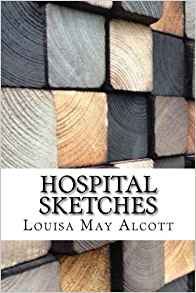-
Hospital Sketches
Louisa May Alcott
Paperback (CreateSpace Independent Publishing Platform, July 3, 2018)Tribulation Periwinkle opens the story by complaining, "I want something to do." She dismisses suggestions to write a book, teach, get married, or start acting. When her younger brother suggests she "go nurse the soldiers", she immediately responds, "I will!" After substantial hardship in trying to obtain a spot, she has further difficulty finding a place on the train. She then describes her travel through New York, Philadelphia, and Baltimore en route to Washington DC. Immediately after her arrival, Periwinkle must attend to the wounded from the Battle of Fredericksburg. Her first assignment is washing them before putting them to bed. She converses with the various wounded soldiers, including an Irishman and a Virginia blacksmith. The blacksmith's death in particular touches her deeply. Z
Z
-
Hospital Sketches
Louisa May Alcott, Success Oceo
Paperback (CreateSpace Independent Publishing Platform, Sept. 20, 2016)Classics for Your Collection:goo.gl/U80LCr---------Hospital Sketches is a compilation of four sketches based on letters Louisa May Alcott sent home during the six weeks she spent as a volunteer nurse for the Union Army during the American Civil War in Georgetown.Tribulaton Periwinkle opens the story by complaining, "I want something to do." She dismisses suggestions to write a book, teach, get married, or start acting. When her younger brother suggests she "go nurse the soldiers", she immediately responds, "I will!" After substantial hardship in trying to obtain a spot, she has further difficulty finding a place on the train. She then describes her travel through New York, Philadelphia, and Baltimore en route to Washington D. C.Immediately after her arrival, Periwinkle must attend to the wounded from the Battle of Fredericksburg. Her first assignment is washing them before putting them to bed. She converses with the various wounded soldiers, including an Irishman and a Virginia blacksmith. The blacksmith's death in particular touches her deeply.While serving as a nurse, Alcott wrote several letters to her family in Concord. At the urging of others, she prepared them for publication, slightly altering and fictionalizing them. The narrator of the stories was renamed Tribulation Periwinkle but the sketches are virtually authentic to Alcott's real experiences.Louisa May Alcott's father Amos Bronson Alcott predicted the sketches "likely to be popular, the subject and style of treatment alike commending it to the reader, and to the Army especially. I see nothing in the way of a good appreciation of Louisa's merits as a woman and a writer. Nothing could be more surprising to her or agreeable to us." Her father was right; when it proved popular, Alcott was surprised by her own success. As she wrote: "I cannot see why people like a few extracts from topsey turvey letters written on inverted tea kettles, waiting for gruel to warm, or poultices to cool, [or] for boys to wake and be tormented." Henry James, Sr. wrote her a letter to applaud "her charming pictures of hospital service."The Boston Evening Transcript called the book "fluent and sparkling, with touches of quiet humor and lively wit". Alcott herself wrote, "I find I've done a good thing without knowing it."Scroll Up and Get Your Copy! Z
Z
-
Hospital Sketches
Louisa May Alcott
eBook (, July 11, 2020)Hospital Sketches (1863) is a compilation of four sketches based on letters Louisa May Alcott sent home during the six weeks she spent as a volunteer nurse for the Union Army during the American Civil War in Georgetown.
-
Hospital Sketches
Louisa May Alcott
eBook (, July 7, 2020)Hospital Sketches by Louisa May Alcott
-
Hospital Sketches
Louisa M. Alcott
Paperback (Independently published, March 31, 2018)Tribulaton Periwinkle opens the story by complaining, "I want something to do." She dismisses suggestions to write a book, teach, get married, or start acting. When her younger brother suggests she "go nurse the soldiers", she immediately responds, "I will!" After substantial hardship in trying to obtain a spot, she has further difficulty finding a place on the train. She then describes her travel through New York, Philadelphia, and Baltimore en route to Washington D. C.
-
Hospital Sketches
Louisa May Alcott
Hardcover (Wildside Press, June 10, 2005)A chronicle of the time Louisa May Alcott worked at Georgetown Hospital in 1863.
-
Hospital Sketches
Louisa May Alcott
Paperback (CreateSpace Independent Publishing Platform, Oct. 12, 2017)Before her wider fame as the author of Little Women, Louisa May Alcott achieved recognition for her accounts of her work as a volunteer nurse in an army hospital. Written during the winter of 1862-63, her lively dispatches appeared in the newspaper Commonwealth, where they were eagerly read by soldiers’ friends and families. Then, as now, these chronicles revealed the desperate realities of battlefield medicine as well as the tentative first steps of women in military service. Writing under a pseudonym, Alcott recounted the vicissitudes of her two-day journey from her home in Concord, Massachusetts, to Washington, D.C. A fiery baptism in the practice of nursing awaited her at Washington Hospital, were she arrived immediately after the slaughter of the Army of the Potomac at the battle of Fredericksburg. Alcott’s rapidly paced prose graphically depicts the facts of hospital life, deftly balancing pathos with gentle humor. A vivid and truthful portrait of an often overlooked aspect of the Civil War, this book remains among the most illuminating reports of the era’s medical practices as well as a moving testimonial to the war’s human cost. Z
Z